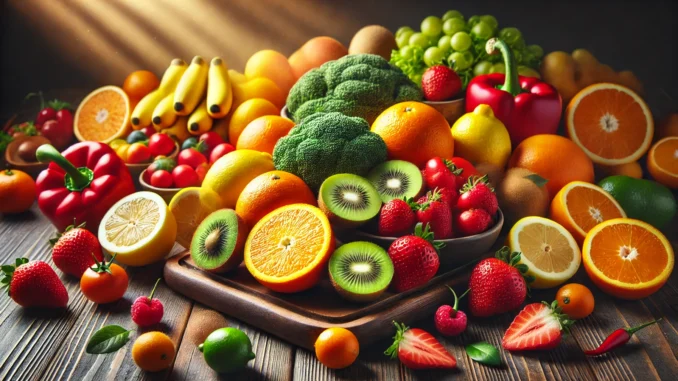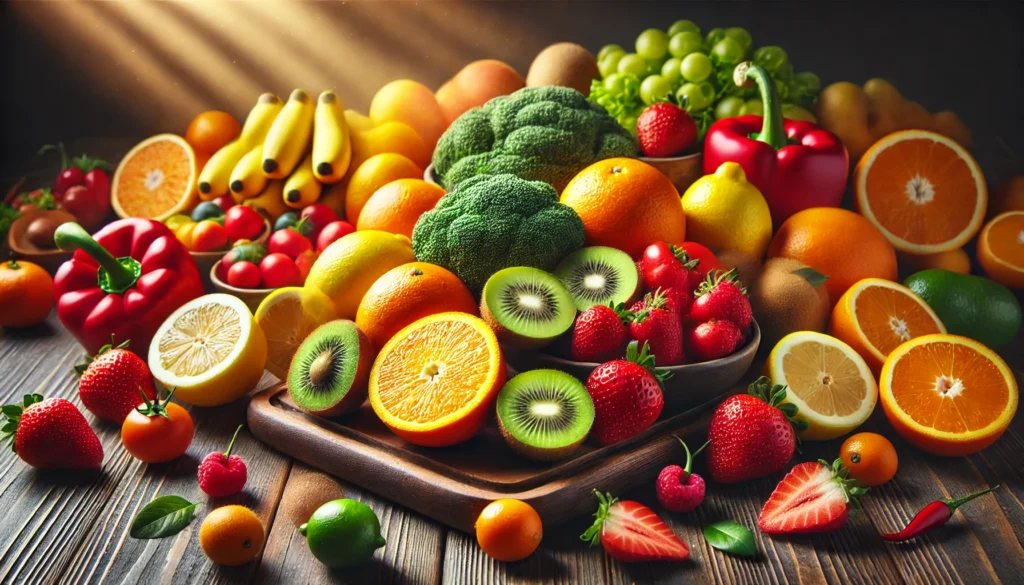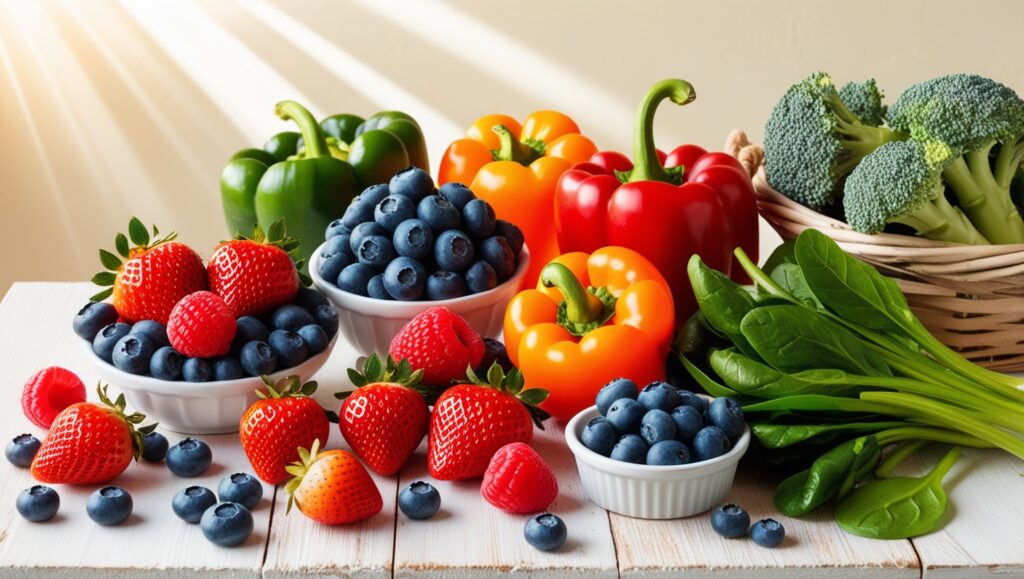
Introduction
Vitamin C, or ascorbic acid, is one of the most essential nutrients we need for overall health. From boosting immunity to helping the body absorb iron, this powerful antioxidant plays an incredible role in our well-being. But, what exactly is vitamin C good for? In this article, we’ll break down the wide-ranging benefits of vitamin C and explore foods that naturally contain this nutrient, so you can ensure you’re meeting your daily needs. Learn more…
What is Vitamin C?
Vitamin C is a water-soluble vitamin that our bodies cannot produce on their own. Known for its antioxidant properties, vitamin C protects our cells from damage caused by free radicals. This nutrient is crucial in several bodily functions, from collagen synthesis to supporting a healthy immune system.
Importance of Vitamin C in Daily Diet
Because our bodies can’t store vitamin “C” it’s essential to get a daily dose. According to dietary guidelines, the recommended daily intake is around 75 mg for women and 90 mg for men, though this can vary depending on age and lifestyle. Regular intake helps keep our bodies strong, youthful, and resilient against disease.

Key Benefits of Vitamin C
4.1 Immunity Booster
Vitamin “C“, is widely known for its role in enhancing immune function. It encourages the production of white blood cells, which help protect against infection. This is why it’s often recommended as a preventive measure during cold and flu season. Learn more…
4.2 Antioxidant Properties
As an antioxidant, vitamin C helps neutralize harmful free radicals and unstable molecules that can damage cells and contribute to chronic diseases. By fighting oxidative stress, vitamin C supports longevity and reduces inflammation.
4.3 Collagen Production

Vitamin C plays a crucial role in collagen synthesis. Collagen is the protein that, provides structure to skin, bones, and connective tissues. Adequate vitamin C intake can help maintain youthful skin, strong bones, and resilient joints. Learn more…
4.4 Skin Health and Healing
Beyond collagen production, vitamin C aids in wound healing and can even reduce the appearance of wrinkles by enhancing skin elasticity. It’s also a common ingredient in skincare products due to its brightening and anti-aging effects. Learn more…
4.5 Heart Health
Research has linked vitamin C with cardiovascular health. It lowers blood pressure, reduces bad cholesterol (LDL), and improves blood vessel function, which may lower the risk of heart disease. Learn more.
4.6 Improved Iron Absorption
Vitamin C enhances the body’s ability to absorb iron from plant-based sources, which is especially beneficial for those following a vegetarian or vegan diet. This can help prevent anemia and boost energy levels.
4.7 Brain Function and Mental Health
Vitamin C supports brain health by preventing neuronal damage caused by oxidative stress. It has also been linked to a reduced risk of cognitive decline and may even support a better mood by aiding in neurotransmitter function. Learn more…
Vitamin C-Rich Foods

5.1 Citrus Fruits
Oranges, lemons, limes, and grapefruits are classic sources of vitamin C. Just one orange can provide more than 70 mg of this essential nutrient.
5.2 Berries
Strawberries, raspberries, and blueberries are packed with vitamin C fiber and antioxidants, making them a great choice for snacks or smoothies.
5.3 Tropical Fruits
Pineapple, mango, and papaya bring a taste of the tropics and a vitamin C boost. Kiwi, in particular, is a superstar, with one fruit containing around 70 mg of vitamin C.
5.4 Vegetables
Bell peppers (especially red ones), tomatoes, and broccoli are some of the best vegetable sources of vitamin C. Including these in your diet can enhance your nutrient intake.
5.5 Leafy Greens
Kale, spinach, and other leafy greens contain moderate amounts of vitamin C and other important nutrients like calcium and iron.
5.6 Fortified Foods
Some cereals, juices, and dairy substitutes are fortified with vitamin C, which can help meet your daily requirements if fresh produce isn’t available.
Best Ways to Consume Vitamin C
When it comes to vitamin C, fresh is best. Cooking can reduce the vitamin C content in foods, so consider eating fruits and vegetables raw whenever possible. Supplements are also available, but it’s best to consult a healthcare professional before starting one.
Signs of Vitamin C Deficiency
Early signs of deficiency include fatigue, irritability, and weakened immunity. Severe deficiency, known as scurvy, can lead to bleeding gums, joint pain, and poor wound healing.
Can You Have Too Much Vitamin C?
While rare, overconsumption of vitamin C can cause digestive issues like diarrhea and stomach cramps. For most people, it’s safe to consume up to 2,000 mg daily, though most don’t need nearly this much.
Conclusion
Vitamin C is a small but mighty nutrient that offers countless health benefits. By including a variety of vitamin C-rich foods in your diet, you can boost your immune system, support heart health, enhance your skin, and protect your brain. Whether from fruits, vegetables, or fortified foods, adding more vitamin C to your daily routine is a simple and delicious step towards better health.
FAQs
1. How much vitamin C is too much?
Consuming up to 2,000 mg, per day is generally considered safe, though exceeding this amount can cause digestive issues.
2. What happens if I don’t get enough vitamin C?
In severe cases, vitamin C deficiency can lead to symptoms like fatigue, weakened immunity, and scurvy.
3. Is it safe to take vitamin C supplements daily?
Yes, but it’s best to stick to recommended doses and consult a healthcare provider if considering high-dose supplements.
4. Can vitamin C prevent the common cold?
While it doesn’t prevent colds, vitamin C can reduce the severity and duration of cold symptoms.
5. Are there any side effects of taking vitamin C?
In high doses, vitamin C can cause stomach cramps, diarrhea, and nausea, but these symptoms usually resolve when intake is reduced.

Leave a Reply